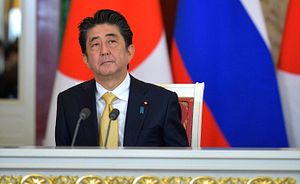Former Japanese Prime Minister Shinzo Abe acknowledged Tuesday his office is being investigated for questionable expenses linked to a dinner party his office hosted for his supporters ahead of an annual cherry blossom viewing party — a scandal that has been on the backburner for months.
Abe made the comment in response to reports Monday that the Tokyo District Public Prosecutors’ Office has been interviewing his aides over the scandal. None of his aides or supporters have been arrested so far.
Abe, who was in power for nearly eight years as Japan’s longest-serving leader, stepped down in mid-September, citing ill health, but some critics have said the scandal might have been a reason. His successor as prime minister, Yoshihide Suga, who served as chief Cabinet secretary in Abe’s government, scrapped the cherry blossom viewing party the day he took office.
The scandal involves a 2018 annual dinner party for which Abe’s guests paid a 5,000 yen ($48) fee. Opposition lawmakers have said that the fee was too low for a party at an upscale Tokyo hotel, and that Abe’s office allegedly covered the difference without reporting it properly.
“My office is fully cooperating with the investigation launched in response to a criminal complaint,” Abe told reporters Tuesday. He declined to give details of the investigation and said he had already provided an explanation during parliamentary sessions earlier this year when questioned by opposition lawmakers.
The investigation comes in response to criminal complaints filed earlier this year by a group of hundreds of lawyers and scholars asking Tokyo prosecutors to investigate whether Abe and executives from his political support group had subsidized party fees for Abe’s supporters in 2018 in alleged violation of campaign and election funds laws.
Japanese law prohibits politicians from giving gifts to constituents.
Abe has repeatedly denied any wrongdoing.
By Mari Yamaguchi for the Associated Press in Tokyo, Japan.

































